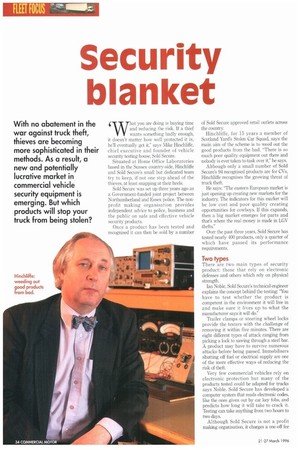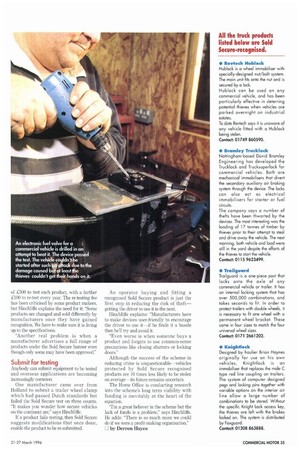Security blanket
Page 36

Page 37

If you've noticed an error in this article please click here to report it so we can fix it.
Chat you are doing is buying time
and reducing the risk. If a thief wants something badly enough, it doesn't matter how well protected it is, he'll eventually get it," says Mike Hinchliffe, chief executive and founder of vehicle security testing house, Sold Secure.
Situated at Home Office Laboratories based in the Sussex country-side, Hinchliffe and Sold Secure's small but dedicated team try to keep, if not one step ahead of the thieves, at least snapping at their heels.
Sold Secure was set up three years ago as a Government-funded joint project between Northumberland and Essex police. The nonprofit making organisation provides independent advice to police, business and the public on safe and effective vehicle security products.
Once a product has been tested and recognised it can then be sold by a number of Sold Secure approved retail outlets across the country.
Hinchliffe, for 15 years a member of Scotland Yard's Stolen Car Squad, says the main aim of the scheme is to weed out the good products from the bad. "There is so much poor quality equipment out there and nobody is ever taken to task over it," he says.
Although only a small number of Sold Secure's 94 recognised products are for CVs, Hinchliffe recognises the growing threat of truck theft.
He says: "The eastern European market is just opening up creating new markets for the industry. The indicators for this market will be low cost and poor quality creating opportunities for cowboys. If this expands, then a big market emerges for parts and that's where the real money is made in LGV thefts."
Over the past three years, Sold Secure has tested nearly 400 products, only a quarter of which have passed its performance requirements.
There are two main types of security product: those that rely on electronic defenses and others which rely on physical strength.
Ian Noble, Sold Secure's technical engineer explains the concept behind the testing: "You have to test whether the product is competent in the environment it will live in and make sure it lives up to what the manufacturer says it will do."
Trailer clamps or steering wheel locks provide the testers with the challenge of removing it within five minutes. There are eight different types of attack ranging from picking a lock to sawing through a steel bar. A product may have to survive numerous attacks before being passed. Immobilisers shutting off fuel or electrical supply are one of the more effective ways of reducing the risk of theft.
Very few commercial vehicles rely on electronic protection but many of the products tested could be adapted for trucks says Noble. Sold Secure has developed a computer system that reads electronic codes, like the ones given out by car key fobs, and predicts how long it will take to crack it. Testing can take anything from two hours to two days.
Although Sold Secure is not a profit making organisation, it charges a one off fee of £500 to test each product, with a further £100 to re-test every year. The re-testing fee has been criticised by some product makers, hut Flinchliffe explains the need for it: "Some products are changed and sold differently by manufacturers once they have gained recognition. We have to make sure it is living up to the specifications.
"Another real problem is when a manufacturer advertises a full range of products under the Sold Secure banner even though only some may have been approved."
Anybody can submit equipment to be tested and overseas applications are becoming increasingly common.
One manufacturer came over from Holland to submit a trailer wheel clamp which had passed Dutch standards but failed tile Sold Secure test on three counts. "It makes you wonder how secure vehicles on the continent are," says Hinchliffe.
If a product fails testing, then Sold Secure suggests modifications that once done, enable the product to be re-submitted. An operator buying and fitting a recognised Sold Secure product is just the first step in reducing the risk of theft— getting the driver to use it is the next.
Hinchliffe explains: "Manufacturers have to make devices user-friendly to encourage the driver to use it—if he finds it a hassle then hell try and avoid it.
"Even worse is when someone buys a product and forgets to use common-sense precautions like closing shutters or locking doors."
Although the success of the scheme in reducing crime is unquestionable—vehicles protected by Sold Secure recognised products are 10 times less likely to be stolen on average—its future remains uncertain.
The Home Office is conducting research into the scheme's long term viability with funding is inevitably at the heart of the equation.
"I'm a great believer in the scheme but the lack of funds is a problem," says Hinchliffe. He adds: "There is so much more we could do if we were a profit-making organisation." El by Derren Hayes
















































































































